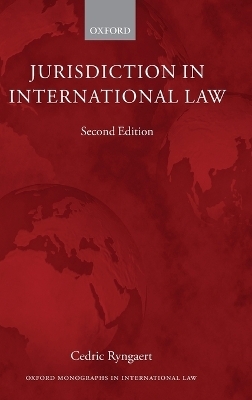
Jurisdiction in International Law
Oxford University Press (Verlag)
978-0-19-968851-7 (ISBN)
This fully updated second edition of Jurisdiction in International Law examines the international law of jurisdiction, focusing on the areas of law where jurisdiction is most contentious: criminal, antitrust, securities, discovery, and international humanitarian and human rights law. Since F.A. Mann's work in the 1980s, no analytical overview has been attempted of this crucial topic in international law: prescribing the admissible geographical reach of a State's laws.
This new edition includes new material on personal jurisdiction in the U.S., extraterritorial applicatins of human rights treaties, discussions on cyberspace, the Morrison case. Jurisdiction in International Law has been updated covering developments in sanction and tax laws, and includes further exploration on transnational tort litigation and universal civil jurisdiction.
The need for such an overview has grown more pressing in recent years as the traditional framework of the law of jurisdiction, grounded in the principles of sovereignty and territoriality, has been undermined by piecemeal developments. Antitrust jurisdiction is heading in new directions, influenced by law and economics approaches; new EC rules are reshaping jurisdiction in securities law; the U.S. is arguably overreaching in the field of corporate governance law; and the universality principle has gained ground in European criminal law and U.S. tort law.
Such developments have given rise to conflicts over competency that struggle to be resolved within traditional jurisdiction theory. This study proposes an innovative approach that departs from the classical solutions and advocates a general principle of international subsidiary jurisdiction. Under the new proposed rule, States would be entitled, and at times even obliged, to exercise subsidiary jurisdiction over internationally relevant situations in the interest of the international community if the State having primary jurisdiction fails to assume its responsibility.
Cedric Ryngaert is Professor of Public International Law at the University of Utrecht, and Associate Professor at Leuven University. He holds a tenured position at both universities. He studied law at Leuven University (1996-2001), where he also obtained his PhD in 2007 (on jurisdiction in international law, under the supervision of Prof. dr. Jan Wouters). He was visiting researcher at Harvard Law School in 2005, and assistant district prosecutor in Leuven in 2006. Cedric has taught courses on public international law, the law of international organizations, and the law of armed conflicts. In 2012, he won the five-yearly Henri Rolin prize (international law and international relations) for his work on jurisdiction.
1: Introduction 2: Public International Law Approaches to Jurisdiction 3: The Territoriality Principle 4: The Principles of Extraterritorial Criminal Jurisdiction 5: A Reasonable Exercise of Jurisdiction 6: A New Theory of Jurisdiction in International Law
| Erscheint lt. Verlag | 30.4.2015 |
|---|---|
| Reihe/Serie | Oxford Monographs in International Law |
| Verlagsort | Oxford |
| Sprache | englisch |
| Maße | 156 x 238 mm |
| Gewicht | 548 g |
| Themenwelt | Recht / Steuern ► EU / Internationales Recht |
| Recht / Steuern ► Öffentliches Recht ► Völkerrecht | |
| ISBN-10 | 0-19-968851-6 / 0199688516 |
| ISBN-13 | 978-0-19-968851-7 / 9780199688517 |
| Zustand | Neuware |
| Informationen gemäß Produktsicherheitsverordnung (GPSR) | |
| Haben Sie eine Frage zum Produkt? |
aus dem Bereich


